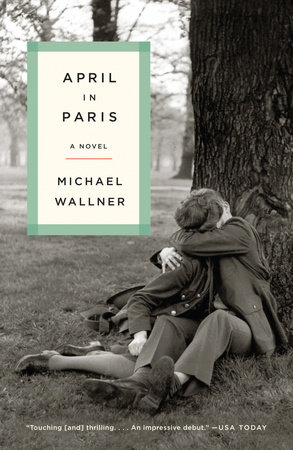Reading Group Center
- Home •
- Books by Category •
- Imprints •
- News •
- Videos •
- Media Center •
- Reading Group Center
April in Paris
By Michael Wallner
—USA Today
The introduction, discussion questions, and suggestions for further reading that follow are designed to stimulate your group's discussion of April in Paris, Michael Wallner's gripping novel about love and deception in Nazi-occupied Paris.
1. Scores of novels and nonfiction books have been written about World War II. In what ways is April in Paris distinctive? What aspects of the war does it bring to light that other works haven't fully explored?
2. Though April in Paris is set during World War II, in what ways does it illuminate the use of torture in our own time?
3. How does Roth feel about his job as translator of prisoner interrogations? Why does he feel compelled to risk so much in order to assume the identity of a Parisian?
4. After he is arrested, Roth comes to a searing realization: “I was a coward who didn't dare make his opposition public. Leibold's brutish corporals were clearer about their convictions than I was about mine” [p. 193]. Is this an accurate self-assessment? What are the consequences of Roth's “cowardice”? How might he have made his opposition public?
5. Roth tells Hirschbiegel, “First something happens . . . . Some random thing. Then the next thing happens. And then the next . . . . One thing after another, deeper and deeper” [p. 86]. What does this statement reveal about Roth's attitude toward life and his own sense of agency? How would Chantal likely regard such a view?
6. Why does Roth fall in love with Chantal? Does Chantal love him in return, or is she merely using him?
7. Roth watches a one-armed man mow the grass with a scythe and asks SS officer Leibold: “How long do you suppose it took him to learn to use that scythe with one arm?” Liebold offers a sardonic reply: “War is the mother of invention” [p. 33]. In what ways is Leibold's statement true? What kinds of inventions did World War II inspire? What does this statement reveal about Leibold's sensibility and the Nazi sensibility in general?
8. Michael Wallner is an actor and a screenwriter as well as a novelist. What scenes in April in Paris seem especially cinematic? In what ways are both Roth and Chantal actors?
9. How do the stories of love and war in April in Paris intersect and illuminate each other?
10. Rieleck-Sostmann tells Roth, “You're a dreamer, Corporal. You're out of step with the times” [p. 40]. Is this true? In what sense is he “a dreamer”? In what ways is he unrealistic, or given to dangerously improbable fantasies?
11. What role does identity play in the novel? How does Roth try to shed his true identity? How does Chantal herself play with different identities or disguises? Does the novel seem to be making some larger point about the fluidity of identity?
12. Discuss the irony-and the terror-of Roth's being a translator during brutal interrogations and then having to undergo the same tortures he has witnessed being done to others.
13. How does Wallner create and sustain suspense throughout the novel?
14. Near the end of the novel, Roth thinks to himself, “I had learned everything and understood nothing” [p. 242]. What does he mean by this? What has he learned? What has he failed to understand?


